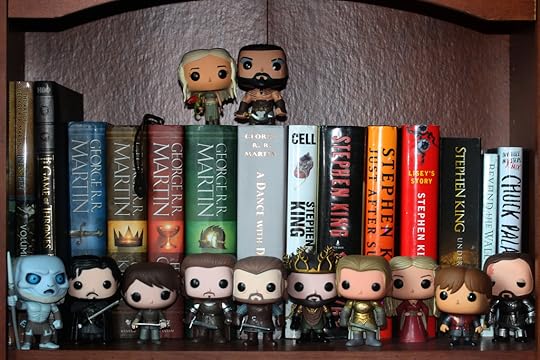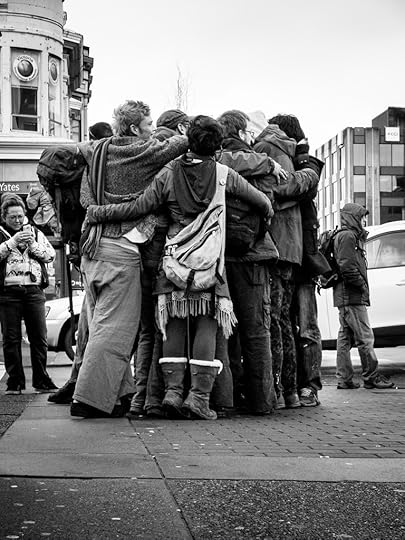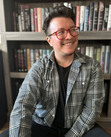Gabe Cole Novoa's Blog, page 67
February 16, 2015
Writing Tip: CPs vs. Betas
 Photo credit: mrurbain on FlickrI’m going to start this post by saying I’ve seen varying definitions of CPs vs. beta readers throughout the interwebs, so this is just how I see it. Your definitions may vary. And that’s okay.
Photo credit: mrurbain on FlickrI’m going to start this post by saying I’ve seen varying definitions of CPs vs. beta readers throughout the interwebs, so this is just how I see it. Your definitions may vary. And that’s okay.(My) quick definitions:
CP (Critique Partner): Someone you regularly trade manuscripts with, with whom you give (and received) detailed critiques on each other’s WIPs. You may even trade the same manuscript several times. This is a long-term deal.
Beta Reader (Beta): Someone you share your manuscript with for overall feedback, oftentimes focused on a couple particular aspects. Usually this is a one-off, but if you find a couple really awesome betas, it can be a longer-term relationship. This differs from CPs, however, because it’s very much dependent MS to MS, while CP relationships are assumed to be an every (or almost every) MS deal.
Note: I’ve seen other writers use betas a little differently, and that’s totally fine! Do whatever works best for you. For me, betas are an extra set of eyes with expertise my CPs don’t have.
Personally, I have three main CPs (I recommend you stick with odd numbers, because it saves you when you get contradictory feedback, which is somewhat inevitable). They see just about all of my manuscripts (with only a couple exceptions), and I’ve been working with each of them for at least over a year. They know my writer ticks (sometimes better than I do), have seen my manuscripts in not-so-fabulous shape, and continually push me to do better. Basically, they are the best.
My CPs see my earliest work, which is to say usually the second draft (which, depending on the WIP, may or may not have gone through more than a round of revision already). Sometimes I send all three the MS at once, sometimes because of scheduling things (or other reasons) I send them the MS in different feedback rounds. Sometimes they see the same MS more than once. It depends on the WIP.
Fun fact: this right here is where I stopped before querying what is now Beyond the Red . Possibly this is part of the reason I had so much revising to do after signing with the Agent of Awesome, but that was, originally, the end of my CP process.
No longer!
Once I’ve received feedback from all three and implemented their suggestions, I now move on (or at least, I will be with the current WIP) to the in-betweeners.
The what? Right. So, I also have readers who kind of fall in between CPs and betas. Some of them I’ve given feedback on MSs, some of them we’ve agreed we should totally trade but haven’t yet, some of them I’ve traded with, then fallen out of touch with, then started planning on trading with again. They are all excellent and have been sorted into respective critique rounds, after my CPs. Not all WIPs are sent to in-betweeners, and like betas, it varies MS to MS. (As of right now, most of my in-betweeners have not seen my work, but that will change shortly.)
From there come the betas. Beta readers, for me, are the last stop between revisions and Agent of Awesome. They help me catch stuff my previous readers didn’t, and I usually use them for really specific issues that weren’t addressed enough earlier (for example: representation). I also ask for general, overall feedback and thoughts, which helps me determine just how much more I need to tweak the MS before sending it off.
What makes betas different from CPs or in-betweeners is I tend to pick them with pretty specific qualifications, and whether or not they see future WIPs largely depends on the needs of that particular project. So this is assumed to be a temporary deal, unless I know a future project will have similar needs, in which case… :)
So that’s how I view the (rather blurry) line between CPs and betas—now I want to hear from you.
Do you use both? How do you define them?
Twitter-sized bites:
Confused about the diff. between CPs & betas? @Ava_Jae shares her thoughts on these important writer relationships. (Click to tweet)
Do you use CPs and betas? How do you define the difference? Join the discussion on @Ava_Jae's blog. (Click to tweet)




Published on February 16, 2015 04:00
February 13, 2015
Romance & Love Writing Roundup
 Photo credit: yanni on FlickrSo tomorrow is Valentine’s Day, which naturally means I should write about romance and love or something like that. Except, as I scrolled through my love/romance-related blog archives, I realized I’ve already done that a lot.
Photo credit: yanni on FlickrSo tomorrow is Valentine’s Day, which naturally means I should write about romance and love or something like that. Except, as I scrolled through my love/romance-related blog archives, I realized I’ve already done that a lot.So! I’m going to share with you guys all of Writability’s current romance/love/face-smooshing related posts for your browsing pleasure.
In chronological order!
Loving Your VillainThe Problem with Love TrianglesRomance in Writing: Don’t Force ItHow to Write Romance WellRomance in Writing: Murder the Insta-LoveWhy Do Your Characters Like Each Other?Discussion: What Relationships Would You Like to See More Of?Vlog: On Writing Strong Secondary Love InterestsHow to Write Awesome Kiss Scenes
Whether you’ll be celebrating Valentine’s Day with a loved one or with a tub of ice cream and Netflix, I hope you all have a fantastic weekend!
Do you know of any great romance-writing posts?
Twitter-sized bite:
Struggling to get your romantic subplots down? @Ava_Jae rounds up love, kissing & romance-writing posts for V-day. (Click to tweet)




Published on February 13, 2015 04:00
February 11, 2015
Character Development Lessons from Game of Thrones
 Photo credit: pullip_junk on FlickrSo about two months ago I finally did that thing everyone and their brother was telling me to do: I watched
Game of Thrones
.
Photo credit: pullip_junk on FlickrSo about two months ago I finally did that thing everyone and their brother was telling me to do: I watched
Game of Thrones
.While usually I’m the kind of person that prefers to read the books before watching the movie (or, in this case, TV show), as the A Song of Ice and Fire books didn’t really grab me when I tried to pick up the first one, I made an exception this time. And…well…
Okay fine, I’ll say it—I’m hooked. (Yes, yes, you were all right, congratulations everyone. *sigh*)
I’ve been thinking for a little bit about why I’ve been enjoying the series so much, and the answer, for me at least, lies in the characters. Because damn, GRRM writes crazy interesting characters. Even the totally despicable ones are fascinating in their own right, which really appeals to me.
And so, because the characters are so very well written, I think there are some lessons that we, as writers, can learn from them. So let’s take a look at what makes these characters so interesting.
Every character has motivations, dreams, etc. What’s great about this is I’m not even talking about just the main ensemble characters—even minor characters, “evil” characters, and characters with short life spans are fully fleshed out with plans, dreams, desires, fears and powerful motivations. Whether it’s Olenna Tyrell (Margaery’s grandmother), Walder Frey, Renly Baratheon, or someone else, every character is layered and ridiculously well-developed.
No one is all good or all bad. Good characters make selfish decisions, and antagonistic characters have people they care about and base their decisions on (somewhat understandable) motivations. In fact, I’d say more characters fall somewhere in the gray area morality-wise than very good or very bad—which becomes especially interesting because you’re never quite sure how they’re going to behave.
Characters make mistakes. Fatal ones, in fact, that end up getting themselves (or people they care about…or both) killed. This is huge because not only does it humanize the characters (after all, who doesn’t make mistakes?) but it also makes us doubly worried about them when we know their decisions could go awry very very quickly. Which leads me to…
Every character is in danger. This is sort of a controversial point about GoT, but I actually love it. Oftentimes, people go into a book (or series, or movie) assuming that the main “good” characters are going to emerge unscathed (or, you know, at least survive). No such assumptions can be made about GoT, which I weirdly like because it means I worry about everyone. It’s realistic (in the sense that no one is magically safe) and something I really admire about the series.
Do you watch (or read) Game of Thrones? What lessons have you learned?
Twitter-sized bite:
Watch or read Game of Thrones? @Ava_Jae shares character development lessons to be learned from this popular series. (Click to tweet)




Published on February 11, 2015 04:00
February 10, 2015
Vlog: Top 5 TBR Books
I've been doing a lot of reading lately, and so I thought I'd share the top five books in my (already-owned) TBR list.
THE BOOKS:
I'll Give You the Sun by Jandy NelsonThe Unbecoming of Mara Dyer by Michelle HodkinThe Body Electric by Beth Revis The Infinite Sea by Rick Yancey Days of Blood and Starlight by Laini Taylor
What are the top five books in your TBR list?
Twitter-sized bite:





THE BOOKS:
I'll Give You the Sun by Jandy NelsonThe Unbecoming of Mara Dyer by Michelle HodkinThe Body Electric by Beth Revis The Infinite Sea by Rick Yancey Days of Blood and Starlight by Laini Taylor
What are the top five books in your TBR list?
Twitter-sized bite:
.@Ava_Jae vlogs about 5 books at the top of her TBR list. What books are at the top of yours? (Click to tweet)




Published on February 10, 2015 04:00
February 9, 2015
What Your First 250 is Telling Your Readers
 Photo credit: pamhule on FlickrI’ve said it before, and it’s likely I’ll say it several times more: your first few pages are, arguably, the most important pages of your book. And the first 250 words? The most important of those first pages.
Photo credit: pamhule on FlickrI’ve said it before, and it’s likely I’ll say it several times more: your first few pages are, arguably, the most important pages of your book. And the first 250 words? The most important of those first pages.This isn’t a secret in the publishing world, in fact, it’s why writers spend so much time and effort making that first 250 gleam. But I think, sometimes, writers don’t fully realize everything that the first 250 words of their manuscript tells readers, whether they intend them to or not.
So here we go.
This is my protagonist. Regardless of whether or not your opening page starts with your actual protagonist, readers will assume the first character they meet is indeed your protagonist. Later pages will confirm or disprove that assumption, but by and large, this is what readers will think.
This is also the first point of connection for your readers—they're immediately going to be making judgments about your protagonist, and it's up to you to decide what kinds of assumptions you want your readers to be making. First impressions matter, and this is where you want your readers to start to care about your protagonist (otherwise, that aforementioned point of connection doesn't exist).
If you don’t mention anyone in the first 250 words of your manuscript, then readers are likely to feel a little lost and disconnected. Characters ground us in the world of your book, and without them at the beginning, it’s very difficult to emotionally connect with your story—after all, no one is there to connect to.
This is my protagonist’s world. In the very first pages, readers are absorbing as much as they can about the world of your book. With the first 250, readers start off with absolutely nothing (except for a quick summary, that is)—we don’t know what your protagonist looks like, where the first scene will take place, the rules of the world, etc. Your first page should start to paint that picture for the readers, and while obviously not everything is going to be answered on the first page, by the end of the initial 250, readers should at least be able to picture where the scene is taking place, and have some initial hints of the world rules in your book.
If you don’t give your readers any hints to grab on to about the book’s world at all, then they’re going to feel a little lost again—this time, because your story will be happening in a vacuum, which means we have characters to hold on to but nothing else. Unfortunately, this is just as problematic as not having a protagonist to hold on to at all…
This is what the writing/voice will be like. Fair or not, readers are going to make assumptions about your entire book based off that first 250.
Read that again. I’ll wait. Got it? Okay.
While a scattered typo, grammatical error, or line of passive voice isn’t going to kill your manuscript, having more than one example of any of those in your first 250 is immediately going to give the reader the impression that they can expect much more of it in the rest of your manuscript. Voice works much the same way—however your first page is written, and whatever bits of voice you give us on the first page, is what the readers are going to expect from the rest of the manuscript.
Remember, however, that this works both ways: not only does it mean you have to make your first 250 shine, but it means you have to make the rest of your manuscript equally shiny. It’s not at all uncommon to see writers polish their first 250 (or first fifty pages), only to forget to do the same to the rest of their manuscript (which didn’t get critiqued quite as much). The only way to avoid this is to try to apply any critique you get on the beginning of your manuscript to the rest of the story.
This is a hint of the initial conflict. Right, so, while you definitely don’t need to spell out the full conflict on the first page (in fact, it’d probably be a mess if you did), readers should have some kind of hint of conflict. It doesn’t have to be the conflict, even, it could be something related to the main conflict, or something that will lead it up to it. But planting the seeds early gives readers something to follow and become immediately interested in as they start reading.
If you don’t have even a hint of conflict on the first page, then you risk making your readers worry that the story might be on the slow side. They might give you some leeway through the first chapter, but I definitely recommend you try to plant those seeds of conflict as soon as you organically can.
As a reader, what do you look for on the first page of a book?
Twitter-sized bite:
What are the first 250 words of your MS telling readers? Writer @Ava_Jae breaks it down. (Click to tweet)




Published on February 09, 2015 04:00
February 6, 2015
Confessions of a Binge Writer
 Photo credit: Victoria Nevland on FlickrRight. So.
Photo credit: Victoria Nevland on FlickrRight. So. There are a lot of posts floating around on the internet on the importance of writing consistently, including posts from yours truly. But there are also a lot of posts out there implying you’re not a real writer if you don’t write every day, and I want to dispel that myth right now.
Or, you know, at least help dispel it.
Let me start this post again.
Hi, my name is Ava, and I’m a binge writer.
When working on a project, I sink into hyperfocus mode. If I’m first drafting, I write every day, and usually aim for around 2,000 words a day. If I’m revising, I revise every day possible, sometimes for only an hour if I’ve had a really tiring day, but many times for huge chunks of the day, when I have the time. When I’m not writing, or revising, or plotting, when I’m in class, or working on something else, or walking around town, my mind is elsewhere. It buzzes with whispers from the story, with scenes I’m working on or revising, with characters, and potential plot possibilities, and snarky lines of dialogue, and emotion emotion emotion. When I’m with people, I’m there, but I’m not.
For however long I’m focused on the project, I’m living in the world of my book.
This means I tend to get through stages quickly. I’m a definite fast-drafter, and average about three weeks when first drafting (regardless of length—the longest first draft in recent memory, which ended up around 83k, I finished in sixteen days). Out of the last couple rounds of revision I’ve done, I averaged about fifteen days per revision round (though I’ve been known to finish heavy revisions in a week, when I have time to block out entire days).
It also means when I finish, I usually emerge pretty tired and definitely in need of a break. Sometimes this lasts a few days. Sometimes a few weeks. Sometimes more than a month.
During that time, besides blog posts like this one, I don’t write. I don’t revise. I don’t work on a project.
What I’m trying to say is, if I’m not working on a project, I don’t write every day. And I force myself not to feel bad about it, because I need those breaks so I don’t burn out. I need some time to let my brain rest, and sit back, read, catch up on Hulu, and relax. I need some mental health days so I don’t run myself into the ground.
Writing every single day, 365 days of the year, is not a requirement of being a writer.
You know what is a requirement? Taking care of yourself. Physically, mentally, emotionally—it’s all important, because in order to create your best, you need to be your best.
So do your best to write consistently and keep the momentum when you can. But don’t forget to take care of yourself in the process.
Are you a binge writer?
Twitter-sized bites:
"In order to create your best, you need to be your best." (Click to tweet)
Writer @Ava_Jae says it's not a requirement to write every day. What do you think? (Click to tweet)




Published on February 06, 2015 04:00
February 4, 2015
On How I Plot a WIP
 Photo credit: fadetowhite on FlickrSo I received a question on tumblr recently from a lovely follower, who asked what my outlining/organizing process is like. My first instinct, of course, was to run to the blog and pull up some posts, but I realized that somehow, I haven’t written about it? At least, not directly.
Photo credit: fadetowhite on FlickrSo I received a question on tumblr recently from a lovely follower, who asked what my outlining/organizing process is like. My first instinct, of course, was to run to the blog and pull up some posts, but I realized that somehow, I haven’t written about it? At least, not directly. That changes right now.
Generally, when I first get a book idea I really like, I’ll let it sit in my head for a little while. Once it’s stewed for a bit, and I’ve decided I still like the idea (usually determined by how much I end up thinking about it during said stewing period), I’ll pull up an Evernote note and start jotting down ideas. How detailed or vague this is depends on the book and what’s in my brain. I don’t really censor in this stage.
Once I have enough ideas to get a general sense of what I want the book to be about, I’ll put together a logline/one-sentence pitch or a book comp. This helps keep me focused while I’m outlining and writing the first draft, and it doesn’t usually take very long (for more info, check out my how to plot without plotting post). By the end of this process, I usually have a good idea of who the protagonist is, who the love interest is (or are), and who the antagonist is.
Next step is actually putting together an outline.
As I’ve mentioned before, I use Scrivener to put together my outlines, using the cork board feature. Initially, my first few flashcards are usually near the beginning of the book, starting with the the inciting incident. And from there…it’s pretty scattered. I jump around from beginning to end, adding things in between, filling in whatever gaps I think of, changing plot points when I think of something better, etc. I ask myself “What if?” questions frequently, try to make the stakes as personal and big as I can, and when I think I’ve put my characters through a lot, I put them through more. I make the lows lower and the highs higher, I add conflict everywhere I can, and if I see opportunities for some twists, I take them. This process continues until I've got a fully fleshed-out plot from beginning to end.
Generally, I don’t go into huge detail with the plot points I figure out. Each flashcard usually will have somewhere between a sentence to a paragraph describing what will generally happen in the scene, and that’s it. How many flashcards I have at the end depends on the book, but I’ll usually end up somewhere between 30-50, and from there I can guesstimate how long I expect the book to be and get ready to start drafting.
And that’s it!
If you’re a plotter, what does your outlining process look like?
Twitter-sized bite:
Struggling to find a plotting process that works for you? Writer @Ava_Jae shares her method for loose outlining. (Click to tweet)
Brainstorming, book comps & Scrivener are all a part of @Ava_Jae's plotting process. What's involved in yours? (Click to tweet)




Published on February 04, 2015 04:00
February 3, 2015
Vlog: How to Survive the Query Wars
Your query letters have been sent! And now begins the delight of every writer: the query wars. Today I'm sharing my top tip on how to survive this delightful stage.
RELATED LINKS:
How to Survive the Query Wars (blog version)How to Query: The Query Letter (vlog)How to Query: Research (vlog)
What tips do you have for getting through the query wars?
Twitter-sized bite:





RELATED LINKS:
How to Survive the Query Wars (blog version)How to Query: The Query Letter (vlog)How to Query: Research (vlog)
What tips do you have for getting through the query wars?
Twitter-sized bite:
About to enter the query trenches? @Ava_Jae vlogs about her top query wars survival tip. #pubtip (Click to tweet)




Published on February 03, 2015 04:00
February 2, 2015
Why I Love the Writing Community
 Photo credit: Joris_Louwes on FlickrSomething I think my non-writing friends and family members have the most trouble wrapping their minds around is the non-competitive nature of the writing community.
Photo credit: Joris_Louwes on FlickrSomething I think my non-writing friends and family members have the most trouble wrapping their minds around is the non-competitive nature of the writing community.Well yes, I understand they’re your friends, they’ll say, but they’re also your competition, right?
I get why this kind of thinking happens. I mean, in most industries, everyone who is not you (or working for/with you) is your competition. Most people aren’t going to buy a Macbook and an HP laptop, or buy a Nook and a Kindle.
But it’s not like that at all amongst writers. Because here’s the great thing about publishing: every reader can buy (and read) as many books as their hearts desire. That means I can buy I’ll Give You the Sun and The Unbecoming of Mara Dyer and Crown of Midnight while also coveting Made You Up and Simon vs. the Homo Sapiens Agenda and More Happy Than Not . I can be truly and legitimately happy for every one of my author friends who sells another book, without worrying for a second that their sale is going to somehow negatively impact my career. Because it won’t.
Granted, there are some more competitive aspects in the heart of publishing that I’m not addressing here, but by and large the writing community is ridiculously supportive and celebratory of everyone’s success and I seriously will never tire of it.
When I was a baby writer, I was terrified of jumping into the online writing community. But I’m so glad I did, because I’ve met some of the kindest, most supportive people in the writing community, and I’ve made some really wonderful friends because of it. And every day I meet new writers who continually show me the positivity and really incredible support system in place online.
If you aren’t already a part of it, and you’re a writer, I can’t recommend getting involved more. It’s a decision that literally changed my life, and I’m so grateful for it every day.
Have you gotten involved with the writing community?
Twitter-sized bites:
Writer @Ava_Jae shares her thoughts on competition and her love for the writing community. (Click to tweet)
"When I was a baby writer, I was terrified of jumping into the online writing community." (Click to tweet)




Published on February 02, 2015 04:00
January 30, 2015
Discussion: When Do You Send Your WIP to CPs?
 Photo credit: Thomas Hawk on FlickrSo as I’m revising my latest WIP, I’ve been thinking a lot about when I think I’ll have this new project ready for my critique partners, partially because I’m kind of psyched to see what they think, and partially because I’ve maybe been torturing them on Twitter with teasers, but that’s neither here nor there.
Photo credit: Thomas Hawk on FlickrSo as I’m revising my latest WIP, I’ve been thinking a lot about when I think I’ll have this new project ready for my critique partners, partially because I’m kind of psyched to see what they think, and partially because I’ve maybe been torturing them on Twitter with teasers, but that’s neither here nor there.I’ve noticed over the years, however, that many writers have hugely different processes as far as what they share with their critique partners and when, which I find pretty fascinating.
For example: I don’t usually share any book ideas with anyone before I’ve started working on a project, largely because I don’t know if a book idea is going to work out until I’ve written at least 10k—my marker for this will actually be a full manuscript and not just an experiment (and even then it’s not really a guarantee). Ideas that I love are hard for me to come by. Even after I’ve plotted something out, and I really like the potential of the story, I never feel confident enough to share it until I’m sure I’m going to finish the manuscript, because I have a history of deciding after a few thousand words that this idea isn’t going to work out.
On the flip side, I know many writers who have many book ideas at a time, and often share them with their critique partners (or even their agents) to get early feedback.
After I’ve written the first draft, I put it away for (at least) a month before diving back into it for revisions. My critique partners never see my first drafts. This is for a couple reasons. Firstly, because I always fast-draft my first drafts, I usually finish with a list (mental, or physical) of things I already know I need to fix or expand upon. This list is usually grows when I do my first read-through, and as I tend not to like to send my critique partners a project I already know has tons of problems, I don't. Maybe it’s just the practical part of me, but if I can tackle and fix a problem before my critique partners know it exists, all the better.
Secondly, because I fast-draft all my first drafts, my first drafts are…er, let’s say not my best writing. Which is totally to be expected with first drafts, but again, I personally prefer to send my critique partners work that I’ve at least attempted to polish.
On the other hand, I know many writers who send their critique partners the first draft basically they day they finish writing. Or maybe a few days later, after doing a super-quick round of tweaks here and there. And that works for them, and that’s awesome.
Lately, my process has been to send my first round of critique partners draft two-point-something. The last one was two point one (meaning I went through two rounds of revision before sending the manuscript to my first round of CPs), and judging by the way this revision is going, it’ll probably be the same for this latest project. And then I basically go back and forth with different rounds of CPs and betas until I’m satisfied and send it off to my agent.
But for me, the only person to lay eyes on the first draft is me, myself, and I. And though I can’t assume that’ll never change, for now, I intend to keep it that way.
Now I want to hear from you: when do you send your WIP to your CPs? And do you share unwritten book ideas with them?
Twitter-sized bites:
When do you send your MS to CPs? And do you share your unwritten WIP ideas? Join the discussion on @Ava_Jae's blog. (Click to tweet)
Unsure when to send your MS to CPs? @Ava_Jae shares her CP-trading process. (Click to tweet)




Published on January 30, 2015 04:00



